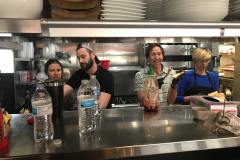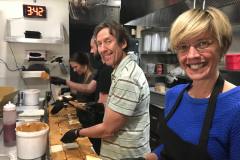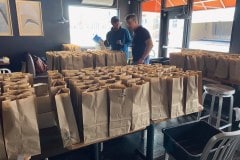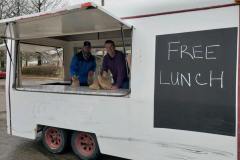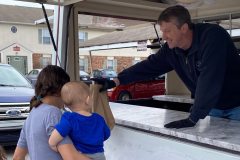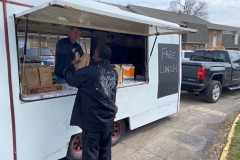Tinker Street Pivots Mission During COVID-19
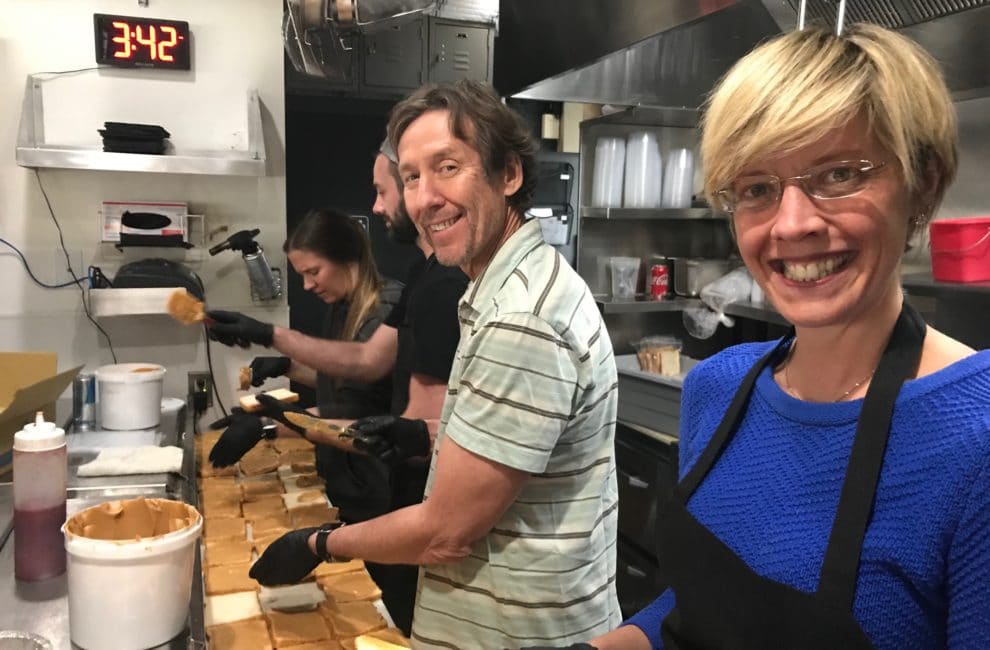
Staff of Tinker Street crafting free lunch Photos courtesy Chuck Dietzen
Chuck Dietzen wears a lot of hats. The retired chief of pediatric rehabilitation medicine at Riley Hospital for Children has traveled the world to help the medically underserved, at one time providing aid with Mother Teresa herself. He has worked in pediatric hospice, given a TEDX talk, wrestled professionally in the ’90s, and was once named a Nigerian chief. Oh, and he’s currently running for Congress.
When Coronavirus turned our world upside down a few weeks ago, Indiana’s Forrest Gump knew he had to “stop talking and start doing.” So, while the rest of us were still trying to figure out how to take a Zoom call, Dietzen reached out to a couple of old friends, Tinker Street owner Tom Main (who had just closed his popular East 16th Street restaurant in the first wave of Coronavirus shut-downs) and Big T’s Auto Salvage owner John Sluss, who happened to have an old trailer that was once used for concessions. After securing financing through a not-for-profit, they set up a mobile food stall called Indy Free Lunch. “We are doing around 600 meals a day,” Dietzen says. “We load up every morning and roll out.”
They stocked up on supplies through places like Costco, looking for the best deals, and transformed Tinker Street’s 900 square feet of restaurant space into a bagged-lunch assembly line. Work surfaces are lined with sandwich bread, and stacked boxes of supplies crowd the windows. Main and a handful of Tinker Street employees, including executive chef Tyler Shortt, start making the daily supply of sandwiches at 10 a.m.—peanut butter and jelly, turkey, ham and cheese. “Not your typical Tinker Street food,” says Dietzen, who packs the sandwiches inside individual bags, along with an orange, granola bar, and piece of candy. Every day, the trailer is filled with bagged meals that get delivered to a couple of Westside apartment complexes, where residents come out and grab a meal when they see the trailer pull in. “I have two boys who run out to the truck, and their dad says we are the highlight of their day,” says Dietzen. “People ask if this is just for children, but it’s for everyone who wants to eat.”
The trailer also does a lap around downtown Indianapolis, feeding anyone who needs food—people experiencing homelessness along the underpasses or in the parking lot across from Wheeler Mission. They stay away from the transit center, at the request of downtown’s police patrol. They want to discourage too many people congregating in one place to eat—the opposite of what restaurants are designed to do.
“Tom [Main] and I have been friends forever,” says Dietzen. “And we have discussed this before—how neat it would be to do something where we serve real nice meals to let people in underserved areas have that experience.” But that was a different time. “Maybe we’ll still do that some day down the road,” he says. “after we get through all of this.”

